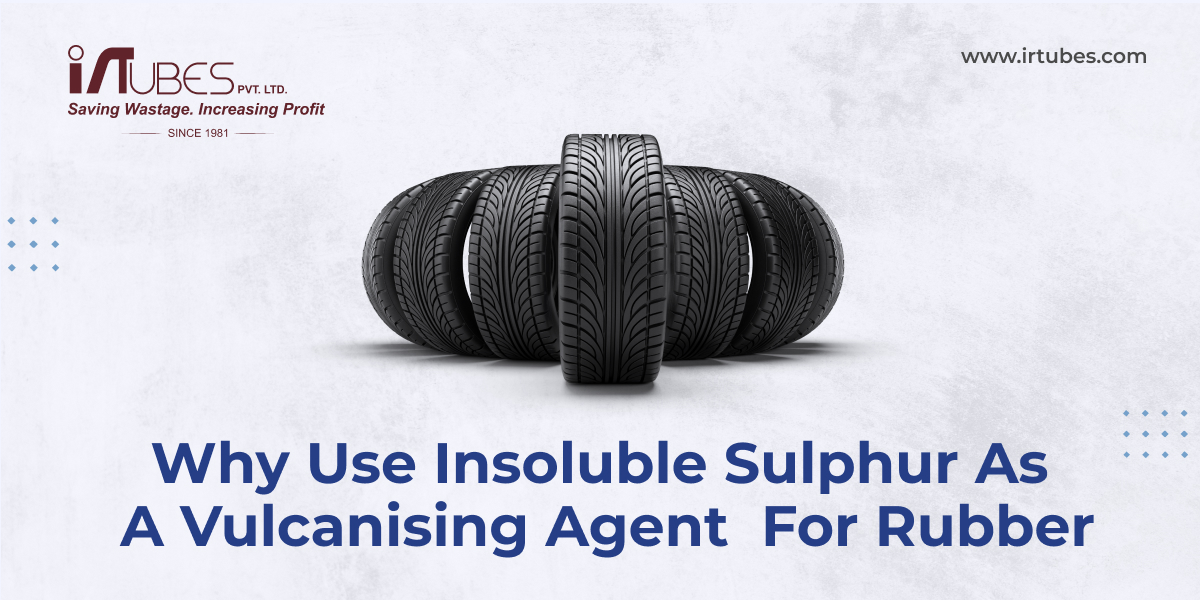
Insoluble sulphur is an important rubber additive. The reason the focus in on the use of INSOLUBLE sulphur is because common soluble sulphur tends to bloom i.e., deposition of sulphur inside or at the surface of the rubber. Insoluble sulphur improves product quality, wearability and resistance to both fatigue and ageing. Insoluble sulphur is mainly used as a vulcanising agent for rubber It allows for a more solid adhesion of the rubber, prevents the rubber from breaking apart and improves resistance to heat and tyre wear, and is therefore an essential raw material in tyre production. The high quality of rubber products can be improved and the defects of ordinary sulphur is made up.
What is Blooming and what is the downside
Let us back up a bit and try and understand blooming in rubber. “Blooming” is the crystallization of compounding ingredients usually on the surface of rubber over a period of time, both in cured or uncured form. This normally results in the migration of the substance from the bulk to the surface.
Blooming issue can occur in any polymer – but more predominant is in elastomers which have saturated backbone e.g., EPDM or extreme polarities e.g. NBR. Bloom not only causes the compound to lose tack for built-up jobs, it can also cause “unjoint “problems in moulded parts and worst still results in cosmetic defects.
Blooming often depletes the aesthetical value of finished component. It may not necessarily impact the functionality of product but can be a cause for rejection in production e.g. stains on black moulded component or coloured finished product.
In unvulcanised compounds, Blooming reduces the tackiness of the stock, which causes difficulties in building up of multi-ply articles (tires, belts, etc).
It therefore, makes sense to use insoluble sulphur as an additive in rubber.
Properties & Advantages Of Insoluble Sulphur
- No blooming during the storage of rubber, keeping the performance of rubber composition to avoid bad adhesion to rubber due to the bloom. Pollution between rubber and mould is thus prevented.
- No transfer in an adjacent adhesive layer, keeping the surface of rubber for adhesive molding.
- A reduction in scorching in mixing and storage.
- A reduction of sulphur by shortening curing time for improvement of ageing property of rubber products.
- Strengthening of adhesion rubber to other materials.
How do you distinguish one brand of insoluble sulphur from another
When choosing which brand of insoluble sulphur to go with it is imperative to look at companies that have cutting edge manufacturing technology in the manufacture of the same. However, what is easy is that there are not that many manufacturers world over. The company that has consistently evolved their technology and have invested in research and innovation, in order to provide the best-in-class products in the industry, is the company to choose.
M/S Omya UK, Ltd. Is amongst the few companies with access to specialised manufacturing technology. Keeping evolving customer preferences and ensuring customer at the centre, has made Omya UK Ltd. A leading supplier of insoluble sulphur. They focus on controlled particle size ingredients and have ground down particle sizes to ensure easy mixing, prevention of heat build-up and has been able to extend bin storage. Multisperse S-IS-70 P is the product of Omya UK Ltd.
Advantages of Multisperse S-IS-70 P
If you are a large tyre manufacturer and are using insoluble sulphur, you should take a look at our pl
Polymer bound insoluble sulphur Multisperse S-IS-70 P from our principal M/s Omya UK Ltd
Multisperse S-IS-70 P gives an edge because it mixes faster, improves dispersion, requires lower shear energy in put with lower temperature rise for faster throughput and better batch to batch reproducibility. Compared to insoluble sulphur powder or oiled powder derivatives it requires a shorter mix and dispersion cycle. Lower temperature rise on mixing highly filled compounds results in very little chance of it turning back to soluble sulphur.
Take a look at all the advantages you get:
- Multisperse S-IS-70 P is made at a low temperature with high thermal stability so you can depend on it not turning back to soluble sulphur. It is perfectly homogenised and dispersed so there’s no agglomeration or electrostatic attraction of fine insoluble sulphur particles that affects your dispersion and final vulcanised properties.
- Multisperse S-IS-70 P is compatible with different polar polymers. Wettability and dispersibility of the insoluble sulphur is much improved, which makes pre-dispersion in different polymers faster and more homogeneous.
- Multisperse S-IS-70 P uses controlled particle size ingredients which makes mixing easier prevents heat build-up, extending bin storage of mixed compound and on processing stability. So, you have a shorter mix cycle and a better throughput per batch. It aids and resists reversion to soluble sulphur by keeping the mix temperature profile low allowing further processing.
- Shaping and building of the different tyre components can be achieved without premature initiation of the vulcanisation reaction. Hence all components of the tyre composite can be built with confidence that onset of final vulcanisation is well controlled by your process providing reproducible high quality and high-performance tyres.
- It can withstand pH change better when using either silica or carbon black reinforcing fillers and it is resistant to reaction with alkaline accelerators and sulphur donors. Bin storage stability of the mixed compound is much longer.
- There is no blooming of crystallizing soluble sulphur on compound surface. It prevents possible migration into bonding cements resulting in controlled and improved reproducibility of cohesion and adhesion reaction to stell and fabric reinforcement.
- Multisperse S-IS-70 P has an increased resistance to temperature, humidity and chemicals when stored and its polyethylene lined packaging means a lower disposal cost and reduced hazard waste.
Conclusion
In addition to being universally recognized as the best vulcanizing agent, it is widely used in the manufacture of tyre, belting, shoes, cable and wire insulating materials. Therefore, due to its non-blooming characteristic, insoluble sulphur is widely used in the manufacture of tyres and other synthetic rubber products.
I R Tubes Pvt. Ltd. is a leading specialty chemical supplier for the chemical industry. Contact I. R. Tubes on info@irtubes.com or Call: 9689927193 for more information
Raju Jethmalani
Share on:
